译林版(2019)选择性必修第一册Unit 4 Exploring poetry Integrated skills(2)课件(共21张PPT)
文档属性
| 名称 | 译林版(2019)选择性必修第一册Unit 4 Exploring poetry Integrated skills(2)课件(共21张PPT) |
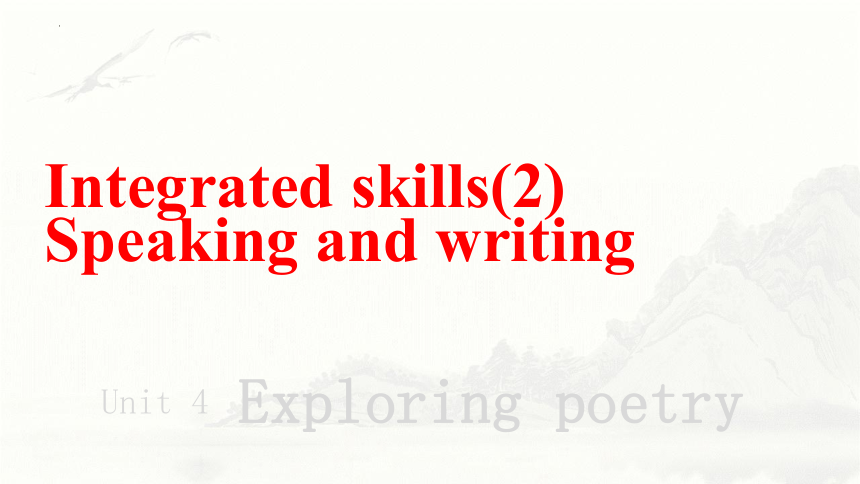
|
|
| 格式 | pptx | ||
| 文件大小 | 2.8MB | ||
| 资源类型 | 教案 | ||
| 版本资源 | 牛津译林版(2019) | ||
| 科目 | 英语 | ||
| 更新时间 | 2024-04-01 21:32:33 | ||
图片预览

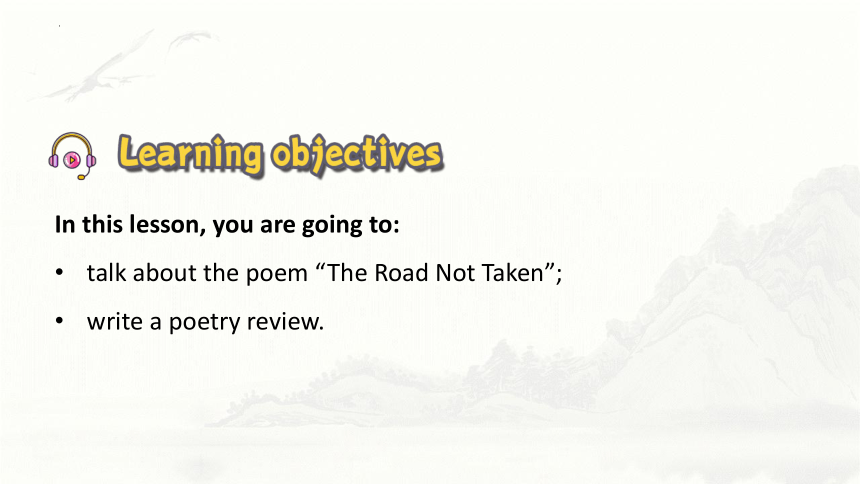
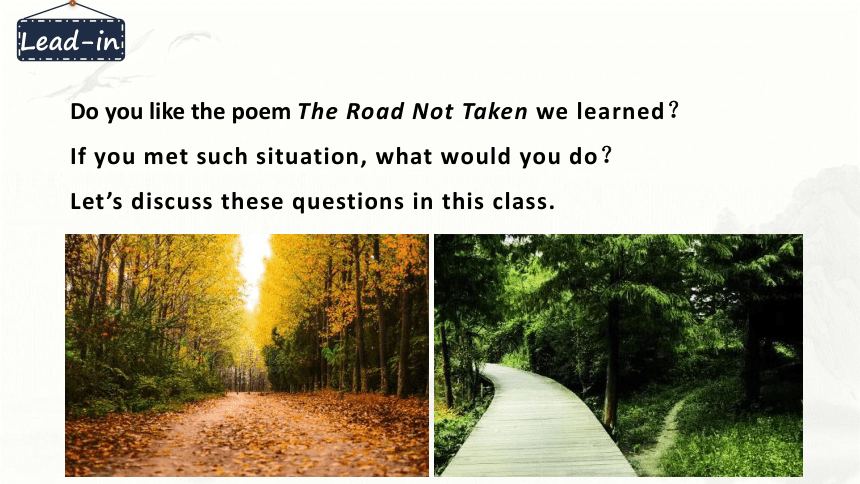
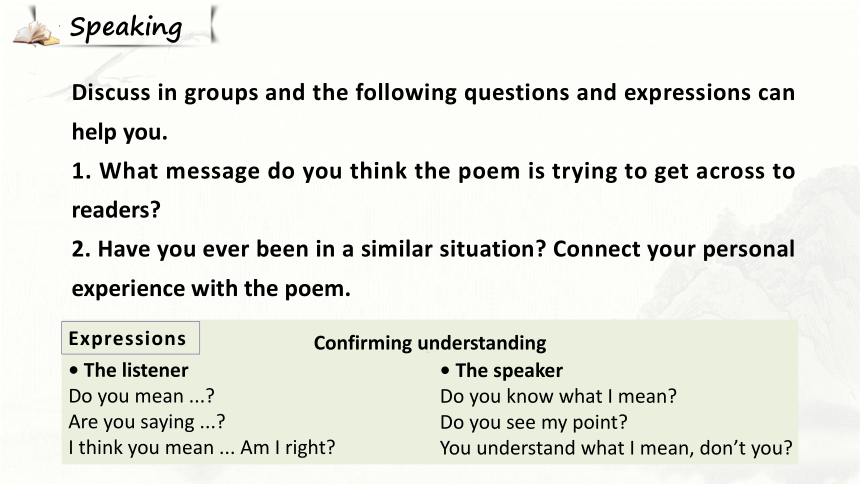
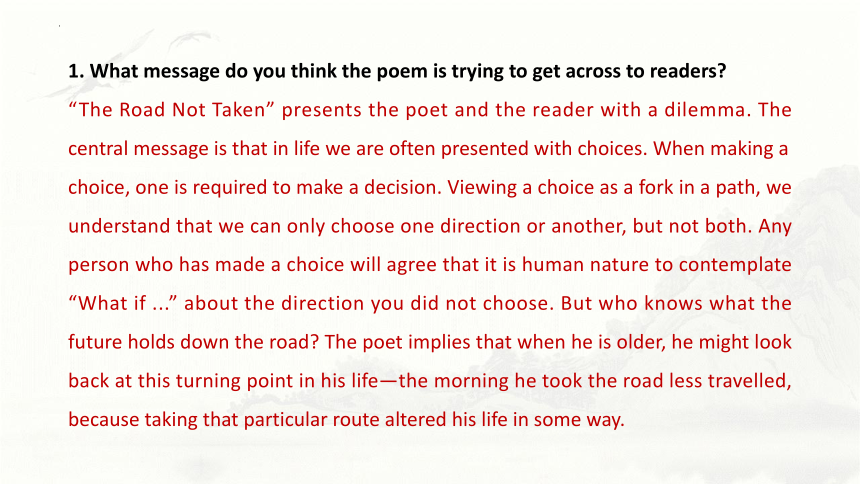
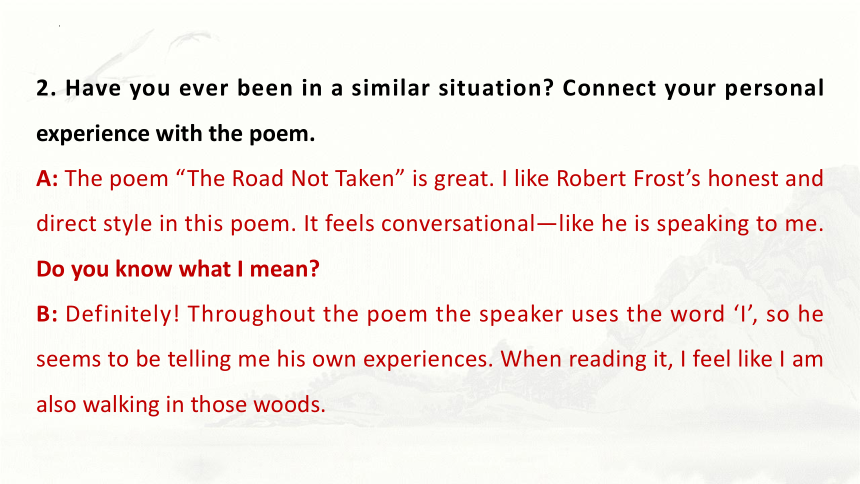
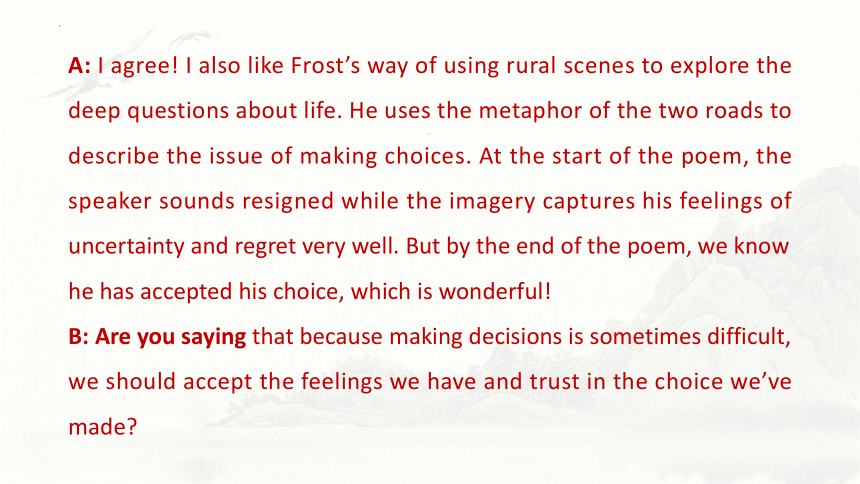
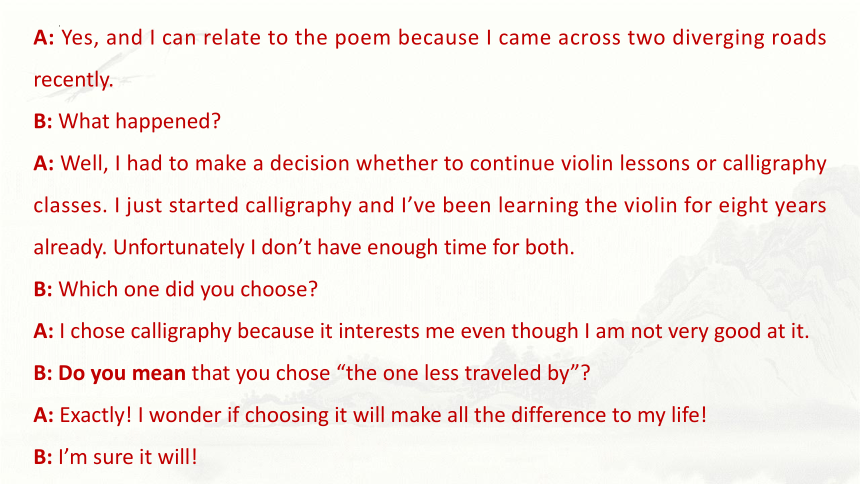
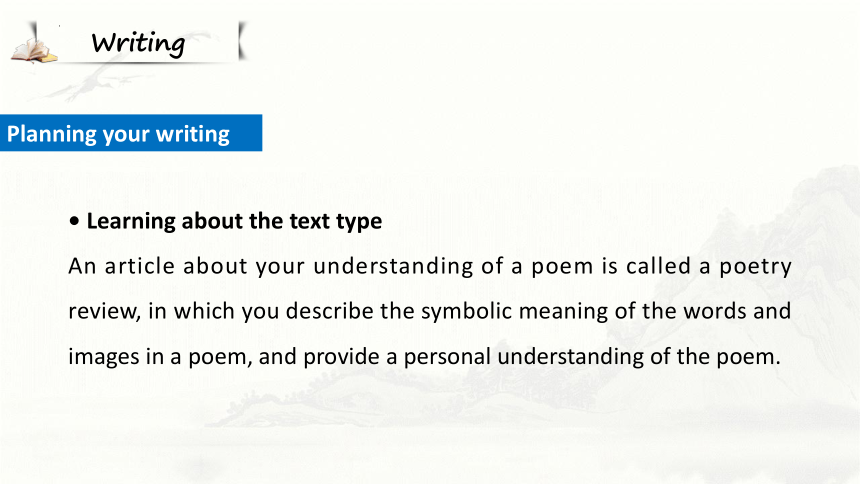
文档简介
(共21张PPT)
Integrated skills(2) Speaking and writing
Unit 4
Exploring poetry
In this lesson, you are going to:
talk about the poem “The Road Not Taken”;
write a poetry review.
Lead-in
Do you like the poem The Road Not Taken we learned?
If you met such situation, what would you do?
Let’s discuss these questions in this class.
Speaking
Discuss in groups and the following questions and expressions can help you.
1. What message do you think the poem is trying to get across to readers
2. Have you ever been in a similar situation Connect your personal experience with the poem.
Confirming understanding
The listener
Do you mean ...
Are you saying ...
I think you mean ... Am I right
The speaker
Do you know what I mean
Do you see my point
You understand what I mean, don’t you
Expressions
1. What message do you think the poem is trying to get across to readers
“The Road Not Taken” presents the poet and the reader with a dilemma. The central message is that in life we are often presented with choices. When making a choice, one is required to make a decision. Viewing a choice as a fork in a path, we understand that we can only choose one direction or another, but not both. Any person who has made a choice will agree that it is human nature to contemplate “What if ...” about the direction you did not choose. But who knows what the future holds down the road The poet implies that when he is older, he might look back at this turning point in his life—the morning he took the road less travelled, because taking that particular route altered his life in some way.
2. Have you ever been in a similar situation Connect your personal experience with the poem.
A: The poem “The Road Not Taken” is great. I like Robert Frost’s honest and direct style in this poem. It feels conversational—like he is speaking to me. Do you know what I mean
B: Definitely! Throughout the poem the speaker uses the word ‘I’, so he seems to be telling me his own experiences. When reading it, I feel like I am also walking in those woods.
A: I agree! I also like Frost’s way of using rural scenes to explore the deep questions about life. He uses the metaphor of the two roads to describe the issue of making choices. At the start of the poem, the speaker sounds resigned while the imagery captures his feelings of uncertainty and regret very well. But by the end of the poem, we know he has accepted his choice, which is wonderful!
B: Are you saying that because making decisions is sometimes difficult, we should accept the feelings we have and trust in the choice we’ve made
A: Yes, and I can relate to the poem because I came across two diverging roads recently.
B: What happened
A: Well, I had to make a decision whether to continue violin lessons or calligraphy classes. I just started calligraphy and I’ve been learning the violin for eight years already. Unfortunately I don’t have enough time for both.
B: Which one did you choose
A: I chose calligraphy because it interests me even though I am not very good at it.
B: Do you mean that you chose “the one less traveled by”
A: Exactly! I wonder if choosing it will make all the difference to my life!
B: I’m sure it will!
Writing
Planning your writing
Learning about the text type
An article about your understanding of a poem is called a poetry review, in which you describe the symbolic meaning of the words and images in a poem, and provide a personal understanding of the poem.
Learning about the structure
When writing an article about your understanding of the poem, you can follow the structure below:
Introduce the poet and the poem briefly.
Analyse and evaluate the artistic characteristics of the poem, such as its sound, images and figurative devices.
Give your understanding of the poem’s meaning. It is a good idea to refer to your personal experience or emotion in this part.
Learning about the language
To express your opinion, you can use expressions such as in my opinion, from my point of view, in my eyes, I think/find/suppose/assume, my opinion/view/belief/impression is that, as for me, and it seems to me that.
Activity 1 写作巧技法
本单元的写作任务是写诗歌评论,抓住诗歌的主题,写出诗歌大意,并说明诗歌中所蕴含的寓意。写作步骤一般是“三段式”,具体为:
第一段:简要介绍诗歌的作者及内容。
第二段:详细论述诗歌的主题。
第三段:写出启迪与感想。
常用表达:
(一)开头常用句式
Here is a poem titled “...” by...,which enjoys great popularity among readers.
这是……写的一首题目是……的诗,它深受读者欢迎。
(二)主体常用句式
1.Young as we are,we come to realize that as long as we try,nothing is impossible.
尽管我们年轻,但我们认识到只要我们尝试,一切皆有可能。
2.She often encourages me to face everything,sadness or happiness.
她常常鼓励我要面对一切,无论是悲伤还是幸福。
3.Remember,the best love is to love others unconditionally rather than make demands on them.
记住,最好的爱存在于对别人的爱胜于对别人的索求之上。
(三)结尾常用句式
1.I’m deeply moved by the above poem reminding us of the importance of trying to seize every chance to do what we should before it’s too late in our life.
我被这首诗深深地打动了,它提醒我们及时抓住机遇做好生活中该做的事情的重要性。
2.We should call on people all over the world to change our lifestyles before all hopes have gone.
我们应该号召全世界的人们在希望破灭之前改变我们的生活方式。
Activity 2 习作分步演练
请给唐朝诗人李绅的《悯农》写一篇诗歌评论,要求写出这首诗的大意,并说明诗中所蕴含的作者的感情。
悯 农
唐/李绅
锄禾日当午,汗滴禾下土。
谁知盘中餐,粒粒皆辛苦。
Sympathy on the Farmers
At noon,farmers are weeding,
Down the field,sweat is dropping.
Who knows rice on a dish,
Every grain is full of toiling
注意:1.结合短诗的内容,适当展开想象;
2.突出短诗的主题,结构完整,语义连贯;
3.词数80左右。
第一步 审题谋篇
[审题]
写作要求是写《悯农》的诗歌评论。写作时应注意下面几点:
1.确定文体:这是一篇夹叙夹议文。写作时注意夹叙夹议文的写作特点。
2.主体时态:文章应以一般现在时为主。
3.主体人称:由于是评论一首诗歌,所以人称应该以第三人称为主。
[谋篇]
本文可以分为三段:
第一段:诗歌的作者:李绅;时代:唐朝;地位:深受欢迎。
第二段:介绍诗歌所表达的内容。
第三段:诗歌的写作意图及现实意义。
第二步 遣词造句
[核心词汇]
1.这里有一首……写的诗
2.受……的欢迎
3.频繁地
4.掉到土里
5.美味的
6.提醒某人……
Here is a poem by...
be popular with
frequently
fall into the soil
delicious
remind sb of...
[连词成句]
1.这里有一首李绅写的诗,题目为《悯农》。
_________________ Li Shen and it is titled “Sympathy on the Farmers”.
2.李绅深受中国读者欢迎。
Li Shen _______________ Chinese readers.
3.夏日正午时刻,虽然外面天气炎热,农民依然在地里除草(weed)。
Although it is hot outside at the summer noon time,the farmers _______________________________.
4.他们全身湿透,汗水频繁地掉在庄稼生长的土地上。
They are wet all over and ___________________________________________.The crops grow there.
5.我认为对今天的年轻一代来说,理解这首诗歌并珍惜每粒粮食是很重要的。
I think it’s very important for the young generation today _______________________________________________.
Here is a poem by
is popular with
are still weeding in the fields
their sweat is frequently falling into the soil
to understand the poem and treasure every grain
第三步 句式升级
1.用过去分词作后置定语以及定语从句将句1和句2合成一句话。
Here is a poem titled “Sympathy on the Farmers” by Li Shen who is popular with Chinese readers.
2.用as引导的倒装句改写句3。
Hot as it is outside at the summer noon time,the farmers are still weeding in the fields.
3.用with的复合结构和where 引导的定语从句改写句4。
They are wet all over with their sweat frequently falling into the soil,where the crops grow.
4.用“it is of+抽象名词+主语从句”结构改写句5。
I think it’s of great importance that the young generation today should understand the poem and treasure every grain.
第四步 组句成篇
用适当的过渡词语,把以上词汇和句式,再加上联想内容,组成一篇80词左右的英语短文。
[参考范文]
Here is a poem titled “Sympathy on the Farmers” by Li Shen who is popular with Chinese readers.
It goes like this:Hot as it is outside at the summer noon time,the farmers are still weeding in the fields.They are wet all over with their sweat frequently falling into the soil,where the crops grow.But who knows exactly all our foods,the delicious dishes on our table,come from the hard work of the farmers
Li Shen wrote this poem in order to remind people of the importance of the farmers’ hard work.I think it’s of great importance that the young generation today should understand the poem and treasure every grain.
Remember to check your writing after you finish and exchange drafts between you and your partner. Pay attention to the following aspects:
□Punctuation □Spelling □ Grammar
□Choice of words □Style (formal/informal) □ Structure
Checking your writing
Self-review
Is your understanding of the poem conveyed in a clear way
What do you find the hardest when writing the article
Peer review
Does your partner agree with you on your understanding of the poem
How can you improve your writing to make it more convincing
Integrated skills(2) Speaking and writing
Unit 4
Exploring poetry
In this lesson, you are going to:
talk about the poem “The Road Not Taken”;
write a poetry review.
Lead-in
Do you like the poem The Road Not Taken we learned?
If you met such situation, what would you do?
Let’s discuss these questions in this class.
Speaking
Discuss in groups and the following questions and expressions can help you.
1. What message do you think the poem is trying to get across to readers
2. Have you ever been in a similar situation Connect your personal experience with the poem.
Confirming understanding
The listener
Do you mean ...
Are you saying ...
I think you mean ... Am I right
The speaker
Do you know what I mean
Do you see my point
You understand what I mean, don’t you
Expressions
1. What message do you think the poem is trying to get across to readers
“The Road Not Taken” presents the poet and the reader with a dilemma. The central message is that in life we are often presented with choices. When making a choice, one is required to make a decision. Viewing a choice as a fork in a path, we understand that we can only choose one direction or another, but not both. Any person who has made a choice will agree that it is human nature to contemplate “What if ...” about the direction you did not choose. But who knows what the future holds down the road The poet implies that when he is older, he might look back at this turning point in his life—the morning he took the road less travelled, because taking that particular route altered his life in some way.
2. Have you ever been in a similar situation Connect your personal experience with the poem.
A: The poem “The Road Not Taken” is great. I like Robert Frost’s honest and direct style in this poem. It feels conversational—like he is speaking to me. Do you know what I mean
B: Definitely! Throughout the poem the speaker uses the word ‘I’, so he seems to be telling me his own experiences. When reading it, I feel like I am also walking in those woods.
A: I agree! I also like Frost’s way of using rural scenes to explore the deep questions about life. He uses the metaphor of the two roads to describe the issue of making choices. At the start of the poem, the speaker sounds resigned while the imagery captures his feelings of uncertainty and regret very well. But by the end of the poem, we know he has accepted his choice, which is wonderful!
B: Are you saying that because making decisions is sometimes difficult, we should accept the feelings we have and trust in the choice we’ve made
A: Yes, and I can relate to the poem because I came across two diverging roads recently.
B: What happened
A: Well, I had to make a decision whether to continue violin lessons or calligraphy classes. I just started calligraphy and I’ve been learning the violin for eight years already. Unfortunately I don’t have enough time for both.
B: Which one did you choose
A: I chose calligraphy because it interests me even though I am not very good at it.
B: Do you mean that you chose “the one less traveled by”
A: Exactly! I wonder if choosing it will make all the difference to my life!
B: I’m sure it will!
Writing
Planning your writing
Learning about the text type
An article about your understanding of a poem is called a poetry review, in which you describe the symbolic meaning of the words and images in a poem, and provide a personal understanding of the poem.
Learning about the structure
When writing an article about your understanding of the poem, you can follow the structure below:
Introduce the poet and the poem briefly.
Analyse and evaluate the artistic characteristics of the poem, such as its sound, images and figurative devices.
Give your understanding of the poem’s meaning. It is a good idea to refer to your personal experience or emotion in this part.
Learning about the language
To express your opinion, you can use expressions such as in my opinion, from my point of view, in my eyes, I think/find/suppose/assume, my opinion/view/belief/impression is that, as for me, and it seems to me that.
Activity 1 写作巧技法
本单元的写作任务是写诗歌评论,抓住诗歌的主题,写出诗歌大意,并说明诗歌中所蕴含的寓意。写作步骤一般是“三段式”,具体为:
第一段:简要介绍诗歌的作者及内容。
第二段:详细论述诗歌的主题。
第三段:写出启迪与感想。
常用表达:
(一)开头常用句式
Here is a poem titled “...” by...,which enjoys great popularity among readers.
这是……写的一首题目是……的诗,它深受读者欢迎。
(二)主体常用句式
1.Young as we are,we come to realize that as long as we try,nothing is impossible.
尽管我们年轻,但我们认识到只要我们尝试,一切皆有可能。
2.She often encourages me to face everything,sadness or happiness.
她常常鼓励我要面对一切,无论是悲伤还是幸福。
3.Remember,the best love is to love others unconditionally rather than make demands on them.
记住,最好的爱存在于对别人的爱胜于对别人的索求之上。
(三)结尾常用句式
1.I’m deeply moved by the above poem reminding us of the importance of trying to seize every chance to do what we should before it’s too late in our life.
我被这首诗深深地打动了,它提醒我们及时抓住机遇做好生活中该做的事情的重要性。
2.We should call on people all over the world to change our lifestyles before all hopes have gone.
我们应该号召全世界的人们在希望破灭之前改变我们的生活方式。
Activity 2 习作分步演练
请给唐朝诗人李绅的《悯农》写一篇诗歌评论,要求写出这首诗的大意,并说明诗中所蕴含的作者的感情。
悯 农
唐/李绅
锄禾日当午,汗滴禾下土。
谁知盘中餐,粒粒皆辛苦。
Sympathy on the Farmers
At noon,farmers are weeding,
Down the field,sweat is dropping.
Who knows rice on a dish,
Every grain is full of toiling
注意:1.结合短诗的内容,适当展开想象;
2.突出短诗的主题,结构完整,语义连贯;
3.词数80左右。
第一步 审题谋篇
[审题]
写作要求是写《悯农》的诗歌评论。写作时应注意下面几点:
1.确定文体:这是一篇夹叙夹议文。写作时注意夹叙夹议文的写作特点。
2.主体时态:文章应以一般现在时为主。
3.主体人称:由于是评论一首诗歌,所以人称应该以第三人称为主。
[谋篇]
本文可以分为三段:
第一段:诗歌的作者:李绅;时代:唐朝;地位:深受欢迎。
第二段:介绍诗歌所表达的内容。
第三段:诗歌的写作意图及现实意义。
第二步 遣词造句
[核心词汇]
1.这里有一首……写的诗
2.受……的欢迎
3.频繁地
4.掉到土里
5.美味的
6.提醒某人……
Here is a poem by...
be popular with
frequently
fall into the soil
delicious
remind sb of...
[连词成句]
1.这里有一首李绅写的诗,题目为《悯农》。
_________________ Li Shen and it is titled “Sympathy on the Farmers”.
2.李绅深受中国读者欢迎。
Li Shen _______________ Chinese readers.
3.夏日正午时刻,虽然外面天气炎热,农民依然在地里除草(weed)。
Although it is hot outside at the summer noon time,the farmers _______________________________.
4.他们全身湿透,汗水频繁地掉在庄稼生长的土地上。
They are wet all over and ___________________________________________.The crops grow there.
5.我认为对今天的年轻一代来说,理解这首诗歌并珍惜每粒粮食是很重要的。
I think it’s very important for the young generation today _______________________________________________.
Here is a poem by
is popular with
are still weeding in the fields
their sweat is frequently falling into the soil
to understand the poem and treasure every grain
第三步 句式升级
1.用过去分词作后置定语以及定语从句将句1和句2合成一句话。
Here is a poem titled “Sympathy on the Farmers” by Li Shen who is popular with Chinese readers.
2.用as引导的倒装句改写句3。
Hot as it is outside at the summer noon time,the farmers are still weeding in the fields.
3.用with的复合结构和where 引导的定语从句改写句4。
They are wet all over with their sweat frequently falling into the soil,where the crops grow.
4.用“it is of+抽象名词+主语从句”结构改写句5。
I think it’s of great importance that the young generation today should understand the poem and treasure every grain.
第四步 组句成篇
用适当的过渡词语,把以上词汇和句式,再加上联想内容,组成一篇80词左右的英语短文。
[参考范文]
Here is a poem titled “Sympathy on the Farmers” by Li Shen who is popular with Chinese readers.
It goes like this:Hot as it is outside at the summer noon time,the farmers are still weeding in the fields.They are wet all over with their sweat frequently falling into the soil,where the crops grow.But who knows exactly all our foods,the delicious dishes on our table,come from the hard work of the farmers
Li Shen wrote this poem in order to remind people of the importance of the farmers’ hard work.I think it’s of great importance that the young generation today should understand the poem and treasure every grain.
Remember to check your writing after you finish and exchange drafts between you and your partner. Pay attention to the following aspects:
□Punctuation □Spelling □ Grammar
□Choice of words □Style (formal/informal) □ Structure
Checking your writing
Self-review
Is your understanding of the poem conveyed in a clear way
What do you find the hardest when writing the article
Peer review
Does your partner agree with you on your understanding of the poem
How can you improve your writing to make it more convincing
同课章节目录
- Unit 1 Food matters
- Welcome to the unit
- Reading
- Grammar and usage
- Integrated skills
- Extended reading
- Project
- Unit 2 The Universal Language
- Welcome to the unit
- Reading
- Grammar and usage
- Integrated skills
- Extended reading
- Project
- Unit 3 The art of painting
- Welcome to the unit
- Reading
- Grammar and usage
- Integrated skills
- Extended reading
- Project
- Unit 4 Exploring poetry
- Welcome to the unit
- Reading
- Grammar and usage
- Integrated skills
- Extended reading
- Project
